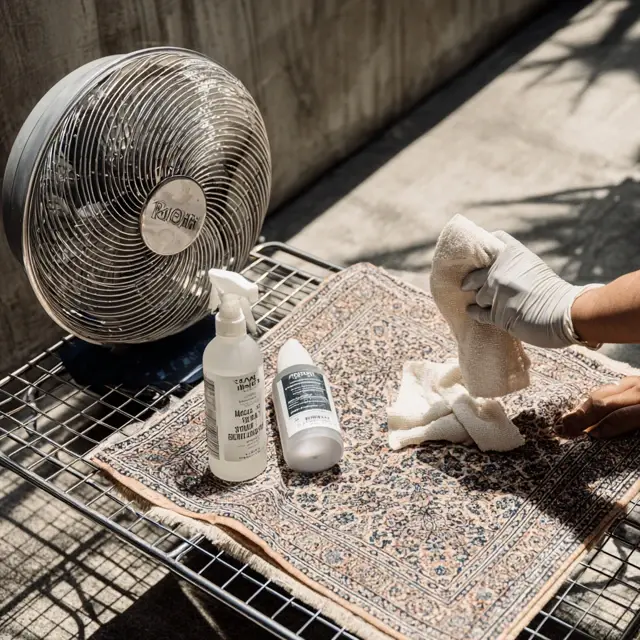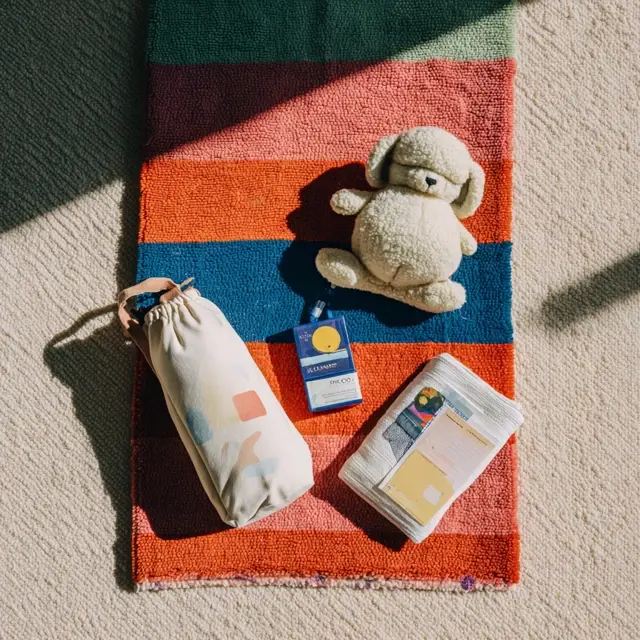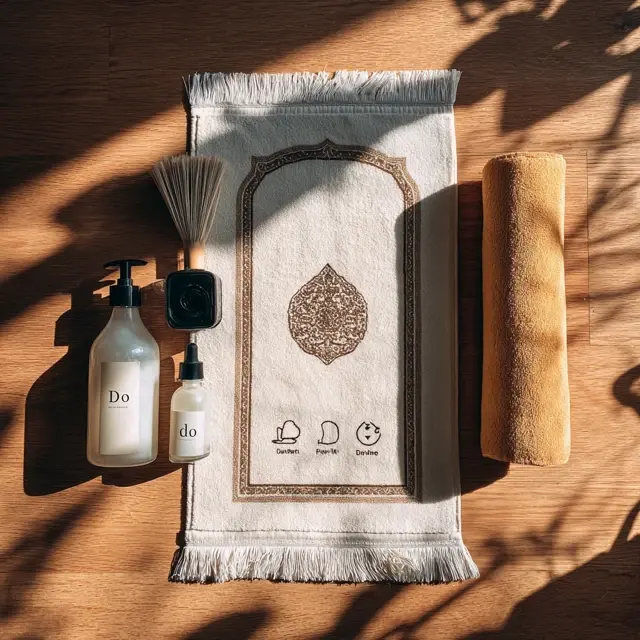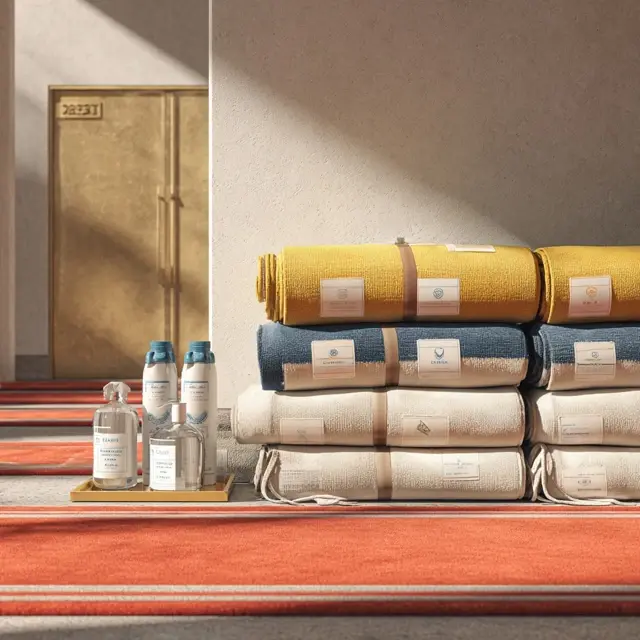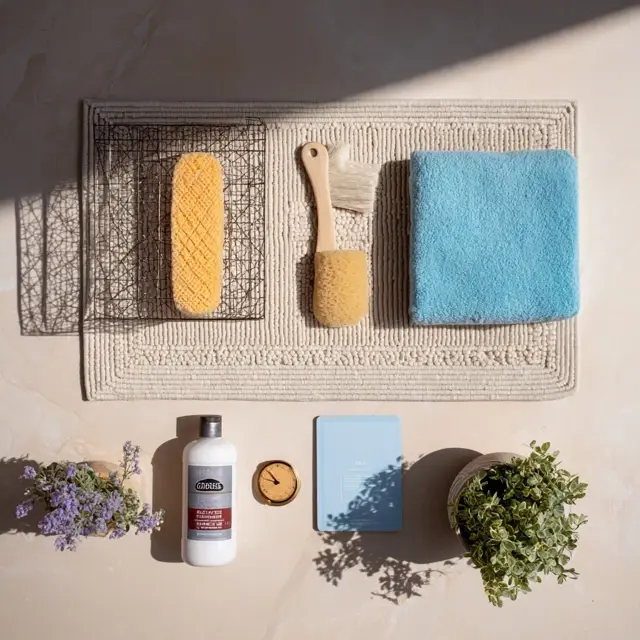Mold and Mildew on a Prayer Mat: What to Do
If your prayer mat smells musty or shows speckled patches, act quickly. Mold and mildew love trapped moisture and low airflow. This guide gives you a fabric-aware plan from first aid to long-term prevention without risking dyes, pile, or backing.
Spot the Problem Fast
- Visual cues: powdery or velvety dots (black/green/gray) that spread irregularly.
- Odor cue: persistent “damp basement” smell that returns after simple airing.
- Swipe check: a damp white cloth pressed on the area lifts discoloration with earthy scent.
Safety & Setup
- Work outside or on a balcony to avoid distributing spores indoors.
- Wear gloves and a basic mask, and wash hands after finishing.
- Never mix chemicals. Do not combine bleach with vinegar or ammonia.
Choose Your Response Level
- Green (light): faint odor, tiny dots < palm size — go mild and localized.
- Yellow (moderate): several patches or seams affected — treat in sections, extend drying time.
- Red (heavy): >20% coverage, deep staining, damaged backing — consult a professional or consider replacement.
Pre-Clean: Reduce the Load
- Shake outdoors to dislodge loose debris.
- Brush gently with a soft clothing brush with the pile to lift surface growth.
- Optional HEPA vacuum: upholstery tool, low suction, single-direction passes; empty the canister outside.
Fabric-Specific Treatment Protocols
Patch-test first on a hidden corner for colorfastness.
Cotton & Polyester (Textile Backing)
- Mix 1 tsp dye-free liquid detergent + 1 cup cool water in a spray bottle.
- Lightly mist and tamp with a microfiber cloth; do not soak.
- If spotting persists, apply a color-safe oxygen cleanser per label, dwell 5–10 minutes, then rinse-blot with clean water.
Microfiber or Printed Face
- Use only the mild detergent mix, short contact time, and gentle tamping.
- Avoid alcohol/solvent spotters and long dwell times on prints.
Wool & Velvet
- Prepare 1 tsp wool-safe detergent + 1 cup cool water.
- Tamp with a nearly wrung-out cloth following the nap; no scrubbing.
- Optional: a very dilute vinegar rinse (1:12 water) dabbed briefly can discourage mildew; immediately rinse-blot with plain water. Always patch-test first.
- Lift nap with a soft brush once nearly dry.
Non-Slip (Latex/TPR) or Foam-Cushioned Backings
- Minimal moisture only: treat from the surface with damp cloths; don’t saturate backing.
- Wipe the backing with a mild detergent cloth, then a clean water cloth; dry flat with airflow.
Drying: Make It Stick
- Press, don’t wring: sandwich between clean towels and press to remove water.
- Dry in shade with a fan, flat on a rack or over two parallel rods for support.
- Confirm the core is dry: feel the back for any cool dampness before storage.
Disinfection Notes
- For colorfast cotton/poly, a brief wipe with a diluted oxygen-based solution can reduce bioload. Avoid chlorine bleach on patterned or delicate mats.
- On wool/velvet, prioritize mechanical removal + fast drying; aggressive chemistry risks dye loss and pile damage.
Common Mistakes
- Soaking the mat (drives spores deeper, stresses adhesives).
- Drying in harsh sun for hours (fades colors, warps coatings).
- Using strong perfumes to “mask” odor (doesn’t solve moisture or growth).
- Scrubbing across velvet nap (creates shine and distortion).
Keep It From Coming Back
- Humidity control: aim for 40–55% RH; use a dehumidifier in damp seasons.
- Air after use: hang for 20–30 minutes in shaded airflow.
- Store breathable: roll, don’t fold; use a cotton or muslin bag on a cool, shaded shelf.
- Rotate locations: avoid persistently cool, damp floors; consider a thin washable topper barrier.
When to Seek Help
- Growth returns within days despite thorough drying.
- Coverage exceeds 20% or reaches the foam/adhesive layer.
- Antique, hand-loomed, or sentimental pieces with instability.
Quick Reference Matrix
| Material | Cleaner | Do | Avoid |
|---|---|---|---|
| Cotton/Poly | Mild detergent → oxygen cleaner (color-safe) | Tamp, rinse-blot, shade + fan | Hot water, chlorine bleach |
| Wool/Velvet | Wool-safe detergent; brief dilute vinegar dab | Follow nap, minimal moisture | Scrubbing, heat, long soaks |
| Printed/Microfiber | Mild detergent only | Short contact, gentle tamp | Solvents, long dwell |
| Non-Slip/Foam | Surface wipe, minimal water | Dry flat with airflow | Saturation, heaters |
Suggested internal link anchors: “Drying a Prayer Mat: Sun, Shade, or Indoors?”, “Non-Slip Backing Care,” “Hand-Washing a Prayer Mat: Gentle Method.”
